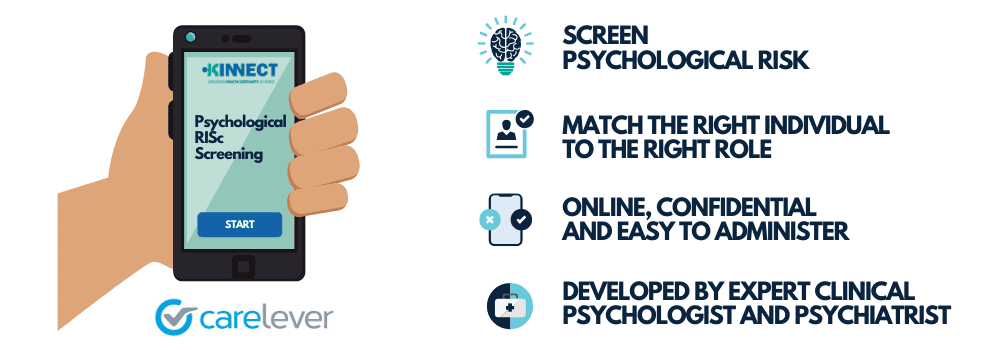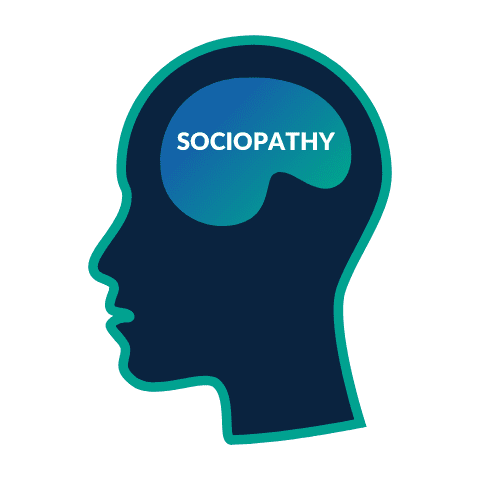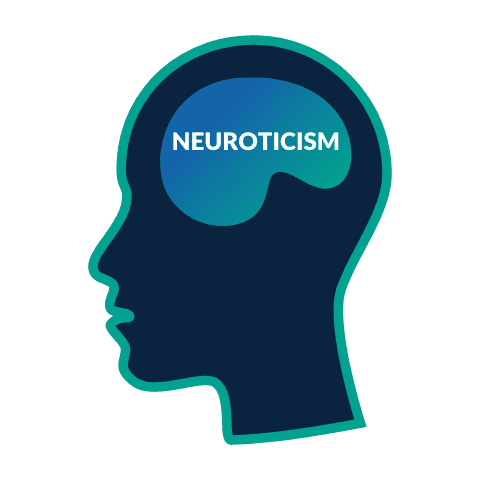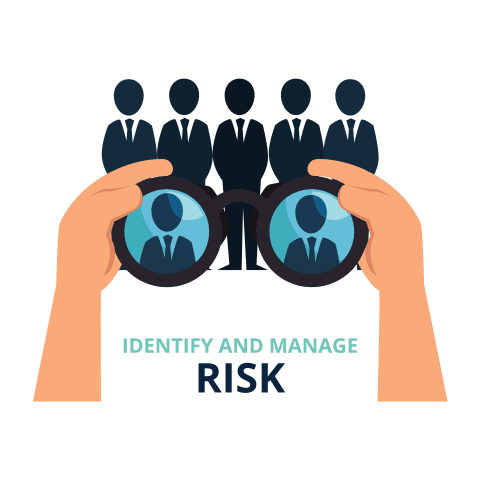KINNECT’s Psychological RISc (Resilience and Integrity Scale) Screen has been developed with the aim of identifying those individuals who might be at increased risk of vulnerability to psychological harm in the workplace.
Simply and effectively evaluate the psychological risk of a candidate entering your workforce or monitor a current employees mental health with KINNECT’s Psychological RISc Screen.

How the RISc Screen Works
The Psychological RISc Screen is a 60-item self report, trait based measure of psychological fitness for the workplace. It is made up of four discrete sub-scales, each comprising of 15 questions.
The RISc Screen is completed online via a smartphone, tablet or computer. It takes approximately 10-15 minutes to complete.
Once submitted, a pre-determined algorithm immediately evaluates the individual’s responses against a formalised risk matrix, determining their overall psychological risk. The RISc score is summarised on a report with additional details on the potential psychological risks that have been identified.
What the RISc Screen Identifies
The RISc Screen has been developed by KINNECT in consultation with a leading Australian Clinical Psychologist and Psychiatrist, specifically for the use within the occupational setting. The tool evaluates four key psychological characteristics pertinent to work and provides organisations with clear recommendations about an individual’s psychological risk. The RISc Screen can be administered as a stand alone instrument or in combination with other assessment methods. It is not used for any diagnostic or clinical purposes.

Sociopathy
People with high sociopath or antisocial traits are generally considered untrustworthy and tend to act with self-serving motives and values. Characteristics of people with high sociopath traits may include:
- Glibness and superficial charm
- Manipulative and conning
- Dismiss the rights of others
- See their self-serving behaviours as permissible
- Grandiose or unrealistic sense of self importance
- Inauthentic and ingenuine
- Lying
- Lack of remorse, shame or guilt
- Shallow emotions
- Incapacity for love
- Need for stimulation, novelty or adventure
The RISc measures non-clinical sociopathy traits and in occupational settings, there are certainly roles that having moderate sociopathy may be an advantage, including for example, some retail or sales positions; emergency services and military positions where there is a higher degree of risk associated with the role.
In other jobs, low-medium sociopathy traits would be an advantage, such as receptionists, community care workers, teachers and health care workers.
A person who scores high-very high on this scale may benefit from training, treatment or remediation to improve their prosocial skills, communication and empathy. As they tend to be more insensitive to others, they may be at higher risk of intimidation or bullying behaviours.
In the workplace, they may require extra support, supervision or culturally appropriate guidance as well as clear guidelines, rules, policies and procedures. Training workshops or courses that may be of benefit include for example, prosocial skills development training, communication training and conflict management training.

Neuroticism
Individuals with high neuroticism tend to have difficulty coping with stress, worry more and are more easily upset and experience lower mood. Characteristics of people with high neuroticism traits may include:
- Prone to anxiety and depressed mood
- Feel easily overwhelmed
- Tend to overthink or worry
- Feel insecure
- Self-consciousness and self-doubt
- Anger or hostile communication
- Impulsive behaviour
- Engage in unhealthy coping strategies
People who score high on this scale may benefit from extra support through counselling or EAP services to help them cope with stress and learn strategies to regulate their emotions in healthy, adaptive ways. They may be a good candidate for Cognitive Behavioural Therapy (CBT) programs to help manage mood.
They most likely require genuine and regular management support and clear, regular, encouraging feedback. Training opportunities that would be of value to those who demonstrate high neuroticism traits include for example mindfulness training or a stress management workshop.
Having moderate neuroticism traits can be a strength in certain roles, for example, a transcription typist who has high attention to detail and is more self-conscious will likely produce fewer errors.

Resilience
High resilience is associated with a personality trait pattern that is mature, responsible, optimistic, persevering and cooperative. Other characteristics of resilient people may include the following:
- See change as a challenge or opportunity
- Work well under pressure and do not easily overwhelm
- Show commitment
- Engage the support of others
- Form close, secure attachment to others
- Make personal or collective goals
- Understand the strengthening effect of stress
- Demonstrate a realistic sense of control/ choices
- Prefer action-oriented or problem-solving approach
- Patience
- Humour
- Tolerance of negative affect
- Optimism / Hope
- Make realistic plans and able to carry out those plans.
- Being able to effectively manage their feelings and impulses in a healthy manner.
- Have good communication skills.
People with lower personal resilience may do better in work roles characterised by:
- Stability and consistency rather than change
- Tasks with low challenge or low complexity
- Tasks that are consistent and don’t require complex decision making.
- Tasks with predictability or repetition
- Few time or productivity demands
- Not emotionally taxing
People with low resilience will benefit from genuine and regular managerial support and/or opportunities to engage with an EAP counsellor. They would also benefit from skills training to build personal resilience and learn strategies to better cope with stress. Training opportunities to boost personal resilience include for example, the WorkWell Toolkit by KINNECT available online or face-to-face.

Integrity
People with integrity are generally considered trustworthy, honest and kind and act with values and moral principles. Having integrity is a positive character trait, where you are regarded as being honest and truthful in your actions. Characteristics of people with high integrity may include:
- Taking responsibility for their actions
- Putting others’ needs above their own
- Offering to help others in need
- Giving others the benefit of the doubt
- Choosing honesty in all things
- Showing respect to others
- humility
- Able to admit they’re wrong
- Reliable
- Genuine kindness
A person scoring low on integrity may:
- Exhibit impulsive behaviour
- Have greater conflict with co-workers.
- Be at higher risk of not following rules or procedures
People with low integrity may benefit from closer supervision. They may do better with clear guidelines, policies and procedures and be aware of consequences if they deviate from procedures. They may also require greater direction and structure to minimise the risk of adverse outcomes at interpersonal or organisational levels. Training opportunities to boost integrity may be beneficial.
How you can use the RISc Screen
There are two ways in which the Psychological RISc Screen can be used in a workplace setting.
1. Pre-employment assessment of candidates to:
- Flag those who may be at higher risk of either experiencing psychological distress themselves or causing/doing psychological harm to others, and
- Help identify more suitable candidates based on their profile and the position they are applying for.
2. Monitor the psychological health of your workforce to help identify employees who may benefit from management support, counselling or training.
Benefits of the Psychological RISc Screen
Pre-Employment Assessments

Helps to select the more suitable candidate for a position.
Two candidates, one position? Both have suitable qualifications and references? Complete the RISc screen and determine which candidates profile is more suitable for the position.
Helps narrow the number of candidates before interview.
Multiple applications? Create a shortlist of candidates more suited to the role.


Helps identify risk factors in candidates that the workplace can actively manage.
Found the perfect candidate, with the right experience and skillset? However, the RISc screen identifies a trait of concern. Establish a plan to help mitigate the potential psychological risk (for example: if low resilience, allow for longer onboarding period, regularly seek feedback on how they are managing and provide clear praise for what they are doing well).
The Right Psychological Traits for the Right Role.
Employees with the right psychological traits for their role will be more likely to experience more meaningful employment and be at a lower risk of adverse psychological injuries in the workplace. When considering an individual’s suitability for a proposed position, it is essential to consider the psychological traits better suited to the role. The following are some examples of jobs and recommended RISc profiles across the four domains:
| Industry | Resilience | Integrity | Sociopathy | Neuroticism | Reasoning |
|---|---|---|---|---|---|
| Emergency Services Officer (e.g. Paramedic, Police Officer or Fire Fighter) | High to very high | High to very high | Moderate to high | Low to moderate | Emergency Support Services roles require a high level of resilience due to their exposure to sensitive situations. They must show a high level of integrity as a trusted member of the community. They need to be social and calm headed, however could display some characteristics of sociopathy. |
| Defence - Front Line Warfare Roles | Moderate to high | High to very high | Moderate to high | Low | Defence personnel should demonstrate high levels of resilience and integrity given their potential exposure to conflict or involvement in distressing events. They can demonstrate some signs of sociopathy given their exposure to risk. |
| Community Care Worker | Moderate to high | Moderate to high | Low to very low | Moderate to low | Community Care workers should demonstrate good personal resilience, and high integrity traits given their responsibilities for the care of others, including the most vulnerable. Low sociopathy is essential for more nurturing and caring roles and given the stressors associated with care work, lower neuroticism would be an advantage. |
| Collection Officer (Debt Collector) | High to very high | Low to moderate | Moderate to high | Moderate to low | The duties of a collection officer often expose them to conflict and very difficult interactions. Having high personal resilience to offset the stressors of the role is essential. Similarly, low neuroticism would be best as the role can be challenging. The role of debt collection can carry a negative social stigma and people with low to medium integrity would do better because of this. Moderate to high sociopathy traits can also be an advantage. |



